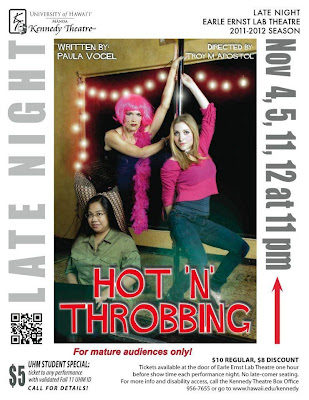What Gets You Off? — HOT 'N' THROBBING at UHM
Late Night theatre at UHM has
certainly taken a turn for the touchier topics: namely, sex and violence. While
the first offering of the season, Stop Kiss, focused on a female/female
relationship, Hot ‘N’ Throbbing—which opened last
night—explores S&M in a family setting. The play, by Paula Vogel, asks what
the difference is between pornography and erotica. Between a woman’s version of
sex as entertainment and a man’s. And, where does fantasy end and reality
begin? How does one influence the other? Which is in control? The writer, the
director, the man, the woman, the body, the mind…?
Get ready to meet some twisted
individuals. Not that the members of this highly dysfunctional family don’t
have their tender sides—Mom sleeps on the couch so the teenage brother and
sister don’t have to share a room (which is a good thing, because if they did,
they’d probably be fucking). Oh, if you didn’t like my use of the F-word just
then, you probably shouldn’t go see this show. Because in this show, words
aren’t just words. Words are action.
The gist is like this: Dad and Mom
split because Dad liked to get drunk and beat on Mom. Mom writes “erotica” to
put food on the table. On one fateful night, the life of this family becomes
entangled in sexual fantasies. The story is told on the one level through the
characters in the family: Mom, Dad, Brother, Sister, and on another, literally
higher level, through two “voices” in the shape of a man and woman. The “voice”
characters represent different elements of the inner and outer worlds of the
play at different times.
Let’s start with these voices.
D’neka Patten plays the female whip-yielding S&M character/inner voice of
Charlene (Mom). Michael Hardy takes on the male voices: the inner thoughts of
Clyde (Dad); a Freud-like narrator; and different roles within the “sex” show.
All of their acting takes place on a small stage behind the “living room” of
the family’s home. It starts off pretty apparent that these voices/actors
represent the script that Charlene is writing, and that they are saying and
doing what she “tells” them to say and do—Charlene is in control. Patten says
what Charlene writes, stops when she stops, waits, sometimes looking
anticipatory, sometimes bored. But as the household family drama builds, so the
lens flips, and the characters/voices on stage become the audience, a very
interested audience. Patten narrates what’s happening in the house instead of
what’s happening in the erotic film script that has been left for later.
Eventually, it’s no longer clear who’s in control of whom. Patten’s shifts are
sometimes abrupt, sometimes subtle, while all the while expressing a consistent
human quality. Her “character” has a heart. Hardy’s different egos are harder
to delineate and relate to. He’s really more of a voice.
The plot of Hot ‘N’
Throbbing functions as a horror story utilized to demonstrate the
ultimate inevitability of sexual violence in the mind, on the page, on the
screen resulting in real-life sexual violence. So what about on the stage? Does
this play constitute pornography? Will it result in sexual violence? Maybe. But
the play is disturbing. I don’t think anyone in the theater was turned on. The
sex and violence isn’t glamorized and polished, not by the end.
Sharon Garcia Doyle plays Charlene.
It’s implied that her character was once more actively sexual, and now puts
that energy into her writing. Clyde (Chris McGahan), her
restraining-order-breaking ex, says, “You taught me about desire.” While some
of what happens when Clyde shows up is borderline absurd, the evidence of a
once-loving (though probably always screwed up) relationship comes through.
Doyle and McGahan bring tenderness and hope to the broken relationship, which
only makes the final result all the more…successful?
at conveying the play’s message.
The teenage children are integral
to all of this, though they aren’t continually present. The daughter Leslie
Ann, played by Josephine Calvo, and the son Calvin, played by Alex Munro, have
issues. Their levels of sexual depravity surpass that of the average hormonal
teen. Their fantasies are revealed in different ways, simulated and confessed.
Calvo’s Lela, as she prefers to be called, should be a frightening sight for
all parents, especially fathers. Her portrayal of a sexually obsessed teen with
masochistic fantasies is disturbingly believable. Munro also delivers,
eliciting sympathy despite his pervish creepiness.
Director Troy M. Apostol has made
some graphic choices. This is adult theatre. In the end, there’s definitely a
message, though it will be up to the individual to decide, should one take the
time to reflect on what they have seen, exactly what that message is and how
strongly it comes through. Some of what’s happening and being said gets lost in
the space and the noise. I think the set and staging could have been closer,
more intimate, more claustrophobic, as these characters are suffocating in the
sickness of their family and their minds. I would have “liked” to be implicated
more, as a viewer/voyeur, maybe by the voice characters. Maybe, just maybe, the
audience gets off too easy, and they won’t bother to go deeper into the
complexities of this play. It’s a topic worth thinking about. It’s a play worth
seeing.
For more information see the Facebook event
page or the Kennedy
Theatre website. The play runs only this weekend and next.



Comments
Post a Comment